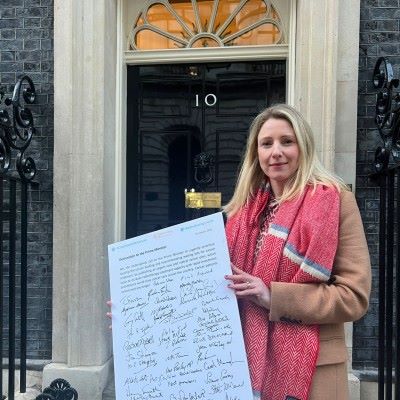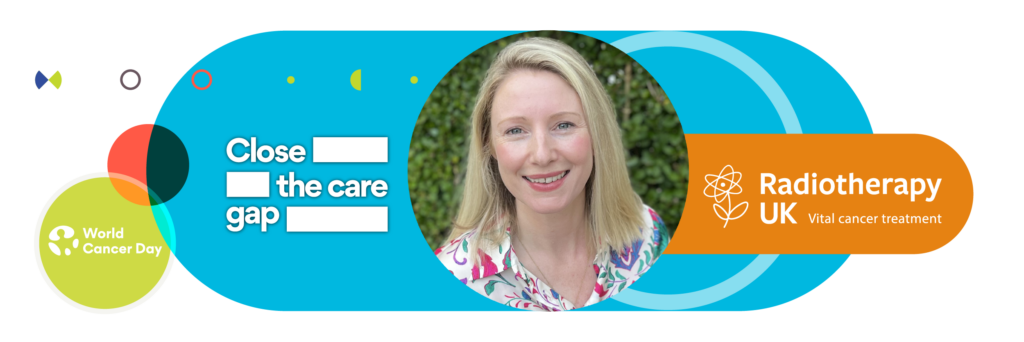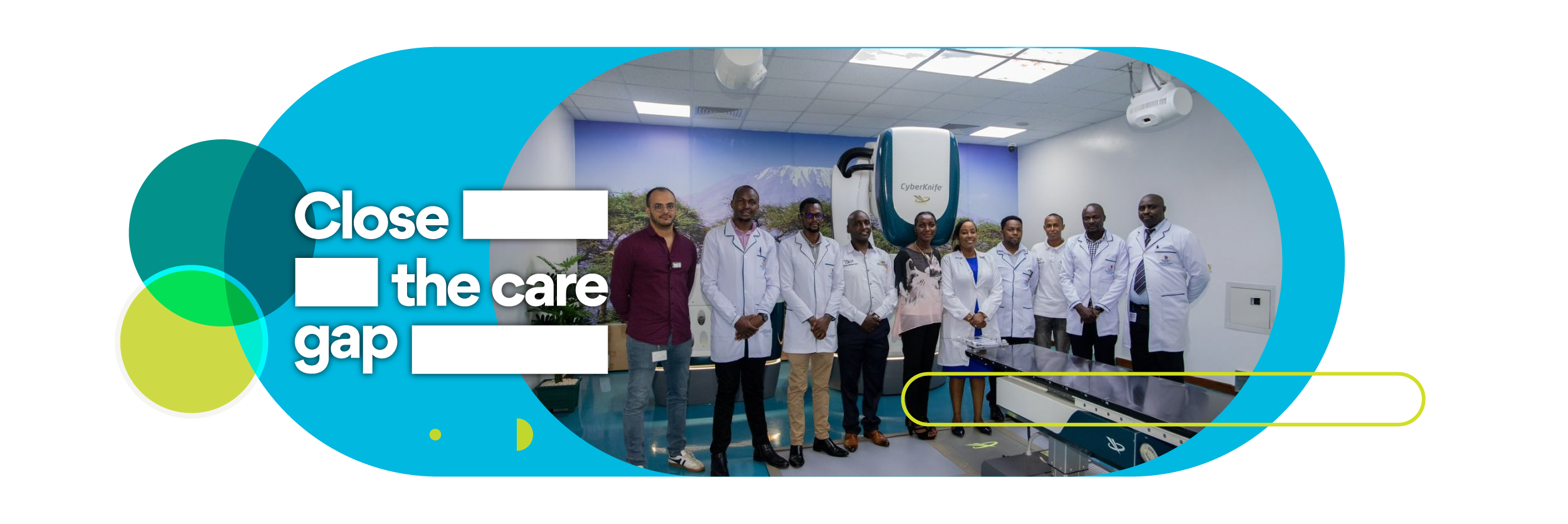Radiotherapy remains a cornerstone of cancer treatment alongside surgery, chemotherapy, and immunotherapy – more than 50% of cancer patients require radiotherapy at some point following their diagnosis[1]. It is needed in 40% of cancer cures. However, in the UK, access consistently trails behind other developed countries. Underinvestment, staff shortages and loss of a dedicated National Cancer Control Plan (NCCP) are exacerbating regional and socioeconomic care inequalities[2]. Stark disparities jeopardize timely treatment for many, contradicting radiotherapy’s classification as a “core” modality by UK oncology leaders.
Barriers to cancer treatments in the UK span beyond proximity
Recent alarming headlines have shone a spotlight on scarcity[3], with “postcode lotteries” (unequal provision of services such as healthcare depending on the geographic area) leaving survival odds heavily dictated by location. But barriers span beyond proximity, with systemic pressures across workforce, equipment and infrastructure domains converging to hamper this critical service.
“The UK is in the deepest cancer crisis in my 30 years as an oncologist. Let this be the end of accepting the unacceptable when it comes to cancer. Hundreds of thousands of cancer patients continue to face deadly delays to lifesaving cancer treatment. Every 4 weeks of delay in receiving treatment can increase the risk of death by 10%. By not having a cancer plan the Government are going against all the international evidence. This must sound the alarm in every political office in the land, all the way up to the Prime Minister. We’re calling on all parties to acknowledge the cancer crisis and commit to delivering a plan to tackle it”
Professor Pat Price – Academic Clinical Oncologist at Imperial College London, Chair of Radiotherapy UK and co-founder of Catch Up With Cancer Campaign
Radiotherapy UK is the only charity dedicated to improving radiotherapy treatment throughout the UK. The charity recently published a report ‘World-class radiotherapy in the UK: Right Patient, Right Treatment, Right Time, which was launched in Parliament to mark World Cancer Day 2024

Sarah Quinlan, Director of Radiotherapy UK
We asked Sarah Quinlan, Director of Radiotherapy UK, some questions about the gaps in cancer care in the UK.
What do you see as the biggest gaps in cancer care in the UK?
Unfortunately, one of the most serious gaps in cancer care is the unacceptably long time cancer patients are waiting to be treated.
In 2023, the length of time cancer patients waited for treatment in the UK reached record highs. Over 225,000 cancer patients in England alone have waited too long for their cancer treatment since 2020. This is deeply concerning because we know that every 4 weeks delay can lead to a 10% increase in mortality. Recent cancer policy has focused on early diagnosis which is incredibly important, but without a similar focus and matched investment in cancer treatment capacity, these patients are simply being added onto an ever-lengthening line for treatment.
Cancer incidence is rising, and it is expected that by 2040 the number of people in the UK diagnosed will increase by a third from 384,000 to 506,000.
Long-term strategic planning is required to deal with the current backlog of patients waiting to be treated and to deal with the rising incidence in the coming decade. Radiotherapy can play a significant role in providing solutions to some of these key treatment capacity challenges. It is a highly effective treatment to cure early-stage disease and is the most cost-effective treatment available, costing on average £3,000 – £4,000 (3,780 – 5,042 USD) per patient. As a high-tech and innovative treatment radiotherapy is primed to harness digital and technological advances to the benefit of cancer patients. It is delivered by a small, highly skilled workforce of only 6,500, providing care to over 160,000 patients across the UK. The current workforce shortage is about 9% or 600 professionals. That is a small number and investing in recruitment and retention could have a huge return on patient capacity and care.
What has caused such a disparity in access to radiotherapy in the UK compared to other high-income countries?
In the UK we have relatively low levels of access to radiotherapy at 24 – 27% in comparison to international standards (52-53%)[4, 5]. Lack of long-term planning and investment has led to piecemeal implementation of new technologies and innovations. Radiotherapy in the UK has been systematically under-funded for decades with only 5% of the cancer budget directed towards it.
There are an estimated 5.1 radiotherapy treatment machines per million population in the UK – below comparative European countries, which have an estimated equivalent number of between 7-10 machines per million. Analysis undertaken by Radiotherapy UK estimates between 13 – 20% of machines are coming to the end of, or exceeding their recommended lifespan. This can mean slower treatments, more treatment interruptions with breakdowns and a lack of technological capability to undertake modern radiotherapy.
We now need a National Plan for Radiotherapy to implement solutions to the current cancer crisis and inform long term planning. Patients need equality of access to high quality radiotherapy on time and that provides the best outcomes and quality of life. This means intelligent investment in workforce, equipment and new technologies. Ultimately, this National Plan needs leadership with a new independent and accountable strategic group supported by the healthcare commissioners across the four nations.
What are the biggest barriers to getting funding for Radiotherapy Services?
Funding for radiotherapy services can be bureaucratic, as existing systems often fail to keep pace with the substantial technological progress in planning and delivering radiotherapy treatments. The absence of financial support for the collection of Patient-Reported Outcome Measures (PROMs) data is a significant barrier to gathering patient-focused data, which could reveal discrepancies in toxicity outcomes.
The provision of funds for radiotherapy equipment, along with the necessary IT infrastructure and software, is inconsistent and does not ensure the routine replacement or enhancement of machines, or consider the expansion of service capacity based on population and anticipated increase in incidence.
What role should government play in addressing these challenges?
Addressing these challenges and improving services for cancer patients should be a Government priority. 1 in 2 of us will get cancer and it impacts every facet of our lives[6]. We need the government and opposition parties to implement a National Cancer Control Plan (NCCP) with intelligent investment and consistent policies.
Radiotherapy must be a central element of any NCCP and through our work as Secretariat of the All Party Parliamentary Group for Radiotherapy (APPG-RT), Radiotherapy UK have collaborated with the radiotherapy community to develop an evidence-based vision for radiotherapy that could lead to improved patient survival and quality of life ‘World-class Radiotherapy in the UK: Right Patient, Right Treatment, Right Time’. It is in the power of politicians, NHS and healthcare commissioners to take this plan and transform the actions set out into positive change for cancer patients.
Are there examples of policy in other countries that you see as successful or a model for others?
Yes, in the late 1990s, Denmark’s 5-year cancer survival rates were notably lower than those of its European neighbours[3]. In response, the Ministry of Health initiated a comprehensive campaign to enhance outcomes, which involved reorganising services, enhancing access, and improving screening procedures. A parallel political emphasis and investment in radiotherapy resulted in Danish services offering advanced treatments with minimal waiting lists.
How do you see advanced radiotherapy solutions affecting access to care in the UK?
Advanced radiotherapy can improve access to the most appropriate, accurate and precise treatment for patients, thus improving outcomes and quality of life.
Hypofractionation is growing in evidence for many cancer sites, do you think it is possible this type of treatment regime can help reduce the burden of patients and departments?
Hypofractionation is a key advance in radiotherapy and can have a positive impact on patient experience as it reduces the amount of time patients need to spend receiving treatment, for example from 25 days to 5. This can also have a positive impact on treatment capacity for a department, but it must be recognised that hypofractionation is an increasingly complex image-guided treatment technique that requires careful planning and increased workforce capacity to deliver.
How is Radiotherapy UK helping to drive change in better access to cancer care?
Radiotherapy UK is the only charity in the UK dedicated to improving access to high-quality radiotherapy treatment and support. We work really hard to achieve this through advocacy and campaigning for a world-class radiotherapy service for patients, patient information services and supporting the development and engagement of a highly skilled and dynamic radiotherapy workforce. We are a tiny charity punching way above our weight.
Our campaigning work seeks to evidence the difference that a fully funded and sustainable world-class radiotherapy service could have for cancer patients’ survival rates and outcomes.
How this makes a difference to patients - A patient perspective
"I am one of only 12% of people in this country that survive longer than five years after being diagnosed with a brain tumour. I got the treatment I needed on time, both surgery and radiotherapy, and everyone deserves the same. It shouldn't be a postcode lottery. Campaigning with Radiotherapy UK and the #CatchUpWithCancer campaign is something I am very proud to be part of. We are a powerful voice, with the patient at the heart of everything, and the progress we are making is well worth supporting."
Patient Advocate
What has been the most promising progress so far?
Our work advocating for equality of access to high-quality radiotherapy has produced the award-winning Catch Up With Cancer campaign. We were the first to highlight the vast numbers of patients caught up in the cancer backlog due to the pandemic, the devastating impact these waits are having and the solutions available. Our considered position, backed up by our analysis and information frequently features in nation-wide media, and informs parliamentary questions, debates, and documents.
We recently facilitated and co-authored the report ‘World-class radiotherapy in the UK: Right Patient, Right Treatment, Right Time’, which we launched at the House of Commons in February 2024. We are really proud to have led the way on this report, collaborating with all stakeholders within the radiotherapy community to highlight how by 2034, world-class radiotherapy could be a reality nationwide. This is a huge achievement for a tiny charity.
Our high-profile campaigning has also translated into positive practical impact, securing additional funding for radiotherapy equipment in 2021 and in 2023 an £89M (112M USD) investment in radiotherapy services by the Welsh Government. But there is much more to do to adequately address the current postcode lottery for access to high-quality cancer treatment.
We are proud to have a strong history of speaking up with integrity and passion for and with cancer patients and the radiotherapy workforce, with arguments based on evidence, data and front-line experience.
What can people do to help?
We are a small charity and struggling to do all the things we want to do and that we can see need to happen. We would be really grateful if people could donate to help us continue our important work for cancer patients in the UK.
Radiotherapy cures cancer and is the most cost-effective cancer treatment. It has the potential to transform cancer treatment, deliver extra capacity and enhance patient outcomes in the UK but to do so requires clear and focused direction and a national ambition to deliver world-class services. At Radiotherapy UK we believe that cancer patients deserve more – more ambition, better chances of survival and better quality of life.
“It’s time to realise the immense potential of radiotherapy by harnessing proven technical advances and innovation to improve patient outcomes. Let us prioritise this cost-effective and curative treatment, where a modest investment could yield a huge leap in progress. If we do this, the world will watch, and we will all be empowered.”
Professor Pat Price – Academic Clinical Oncologist at Imperial College London, Chair of Radiotherapy UK and co-founder of Catch Up With Cancer Campaign
References:
- WHO 2021 ‘New WHO/IAEA publication provides guidance on radiotherapy equipment to fight cancer’ https://www.who.int/news/item/05-03-2021-new-who-iaea-publication-provides-guidance-on-radiotherapy-equipment-to-fight-cancer#:~:text=More%20than%2050%25%20of%20cancer%20patients%20require%20radiotherapy,such%20as%20breast%2C%20cervical%2C%20colorectal%2C%20and%20lung%20cancer.
- Aggarwal A, Choudhury A, Fearnhead N, Kearns P, Kirby A, Lawler M, Quinlan S, Palmieri C, Roques T, Simcock R, Walter FM, Price P, Sullivan R. The future of cancer care in the UK-time for a radical and sustainable National Cancer Plan. Lancet Oncol. 2024 Jan;25(1):e6-e17. doi: 10.1016/S1470-2045(23)00511-9. Epub 2023 Nov 14. Erratum in: Lancet Oncol. 2024 Jan;25(1):e3. PMID: 37977167.
- Anna Bawden (2023) ‘UK Cancer Care in Crisis and Patients will Die Due to Lack of Strategy, Experts Warn’ The Guardian
- Radiotherapy UK (2024) ‘World-class Radiotherapy in the UK: A vision’. Online
- Radiotherapy UK (2023) ‘Radiotherapy: Analysis of how radiotherapy services in the UK compare with other countries’. Online
- NHS: Cancer Overview https://www.nhs.uk/conditions/cancer/
The views contained and expressed in this blog, are those of the author and do not necessarily reflect the views or policies of Accuray Incorporated or its subsidiaries. No official endorsement by Accuray Incorporated or any of its subsidiaries of any vendor, products or services contained in this blog is intended or should be inferred








